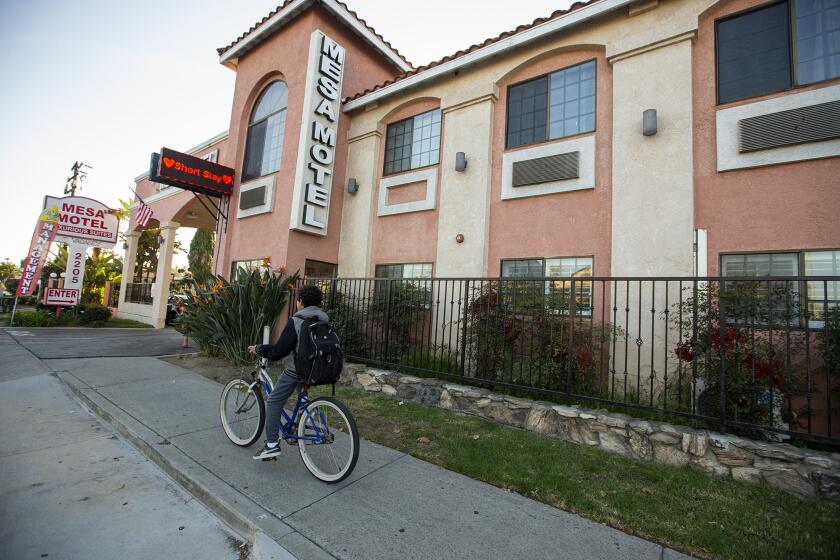Mobile home park conversions still an issue
- Share via
Deirdre Newman
The Planning Commission continues to wrestle with how to increase the
city’s authority over mobile home park conversions in a way that’s
acceptable to park owners.
City leaders initiated in July the creation of more specific
requirements for converting mobile home parks to other uses. Drafting
a new law to expand those procedures has proved a daunting task.
Today, after three continuances, the commission is scheduled to
consider the proposed law. Planning staff members are recommending
continuing the item again if the commission needs more time to
analyze its nuances.
Commission Chairman Bruce Garlich said designing the new law is
challenging because of the vague state code it’s based on.
“I think it’s because we’re trying to create an ordinance to deal
with some rather loosely defined state code that can be taken in a
lot of different directions,” Garlich said. “We’ve looked at a lot of
other cities, and we’re trying to do what’s right for Costa Mesa. And
that’s not an easy task.”
The City Council supported revamping its procedures on mobile home
park conversions after residents of the El Nido and Snug Harbor
trailer parks complained that they weren’t being offered fair
compensation since the parks are being closed.
The city cannot deny an application for a mobile home park
conversion permit or prevent a property owner from closing a mobile
home park. All it is required to do is to review a report required by
the state analyzing the effects of the conversion or closure on the
residents. It may then impose measures the park owner must take to
lessen negative effects without exceeding the reasonable costs of
relocation.
In preparing the proposed law, planners reviewed the ordinances of
cities such as Laguna Beach and Huntington Beach, as well as the
Golden State Manufactured Home Owners League.
The proposed changes would expand the city’s authority to cover
mobile home park closures in addition to mobile home park
conversions.
The proposed law defines terms such as “closure of a park” and
“conversion of a park.” It requires that a park owner file a
relocation impact report, and it specifies what must be in the
report.
One of the requirements is compensation for the negative effects
of conversion on the mobile home owners. The main compensation
requirements for park owners are providing a replacement lot in a
comparable park within a 30-mile radius, with certain exceptions,
paying for the cost of physically moving the home to a new lot and
paying moving costs associated with moving all personal property.
El Nido resident Irene Shannon, who was one of the first to push
the city to adopt a more comprehensive law, said she likes the
proposal because it doesn’t set a minimum or maximum dollar amount on
park owners’ financial obligations.
“I’m very glad they did it that way, because then it’s flexible
enough to apply to whatever situation there is,” Shannon said. “Some
of the parks have very fancy double mobiles that cost $150,000. And
some have little old trailers that cost $10,000 to $15,000, so
putting specifics in there would be a real problem.”
Planning staff members have made some changes in the proposal to
appease park owners, such as simplifying the definition of a park
closure. Under the new definition, the commission can say a park must
close if it finds that the owner has done something to cause someone
to conclude that the owner intends to eliminate or reduce lots
available for rent or lease to the public.
The previous trigger -- that a park would be considered closed
when its owner occupancy dropped to 75% -- did not sit well with park
owners.
Park owner Chris Welsh, who owns the Palms Mobile Home Park, is
still not satisfied with the proposed law, saying it puts too much of
the burden on park owners.
“The state has a fairness level of what should happen when a park
closes -- a person should be given money to move to a new location,”
Welsh said. “That’s an entirely different thing than having their
home moved for them and having a location reserved for them by the
landlord.
“Overall, no park owner I know of would contemplate closing their
park if this ordinance is enacted because it’s so cumbersome both in
time and paperwork required, and [it’s] costly,” he said.
Some El Nido and Snug Harbor residents have been involved in the
process to shape the new law even though they will not be effected by
it. Shannon hopes other mobile home park residents will get involved
in the city’s effort since they could be effected in the future.
“It’s like life insurance,” Shannon said. “You might not think you
need it, but when you have a problem, it’s too late to get it.”
* DEIRDRE NEWMAN covers Costa Mesa. She may be reached at (949)
574-4221 or by e-mail at deirdre.newman@latimes.com.
All the latest on Orange County from Orange County.
Get our free TimesOC newsletter.
You may occasionally receive promotional content from the Daily Pilot.






